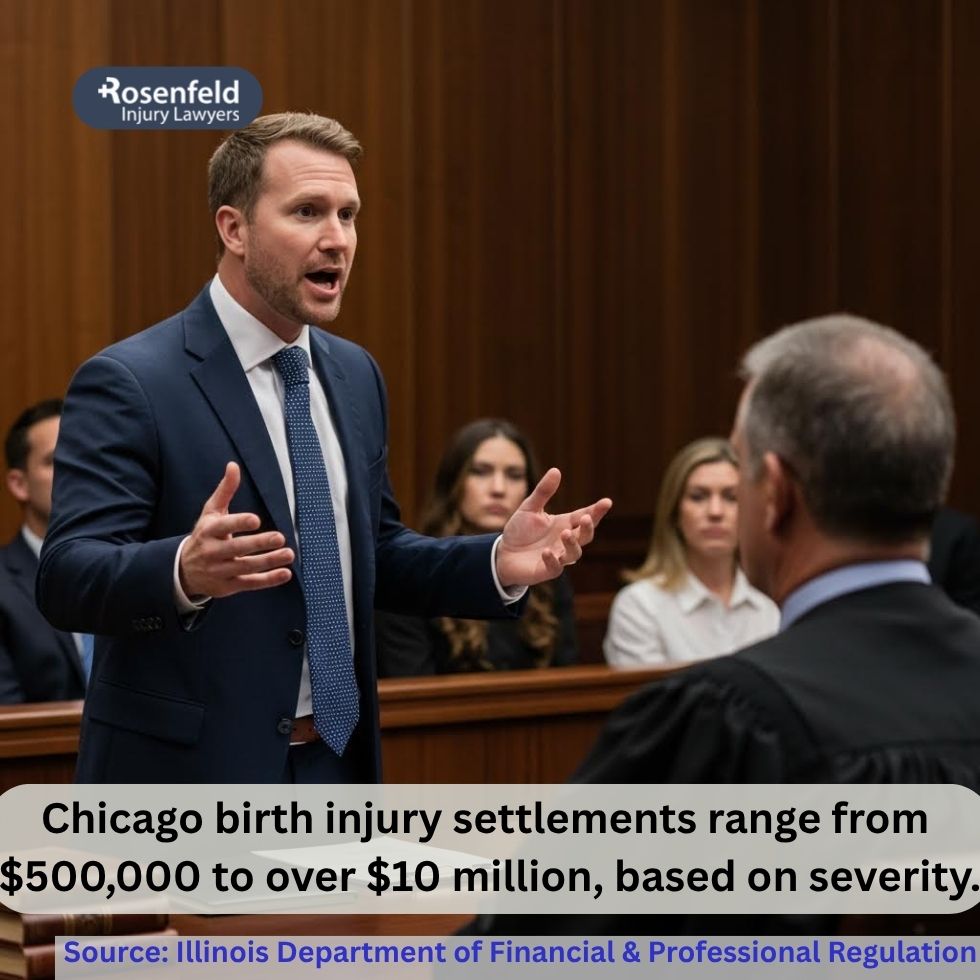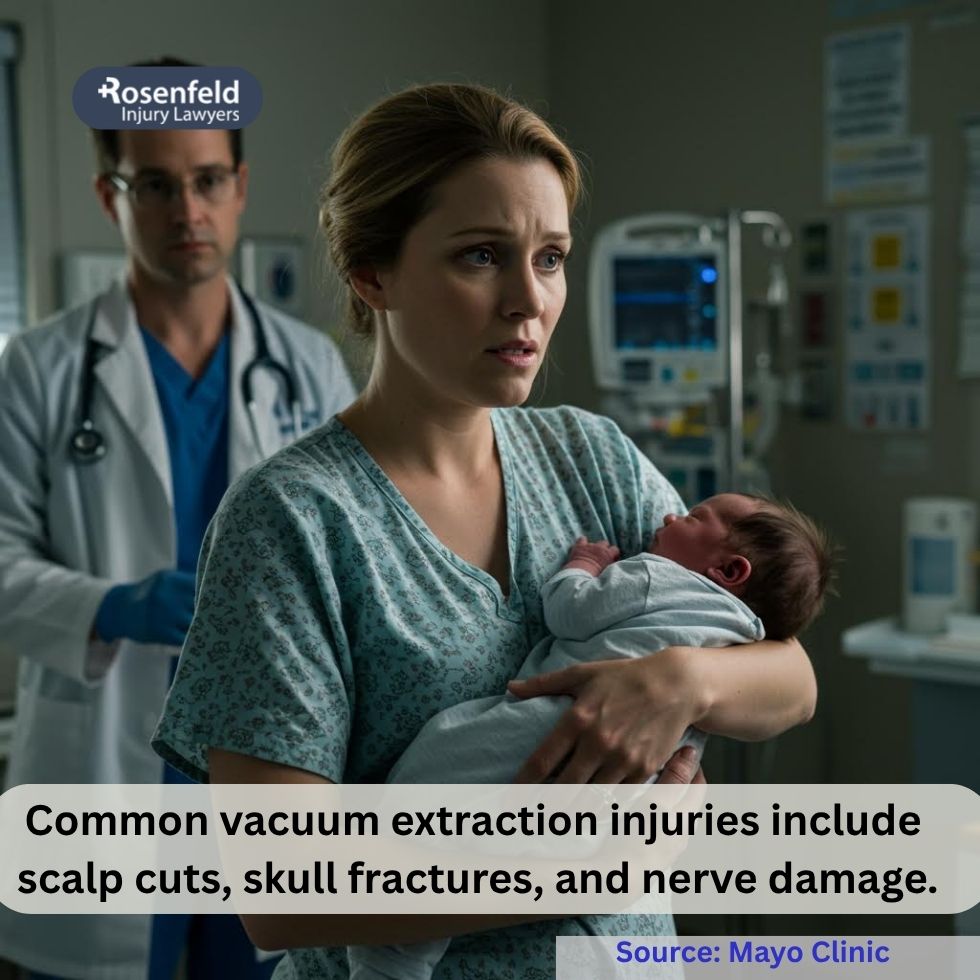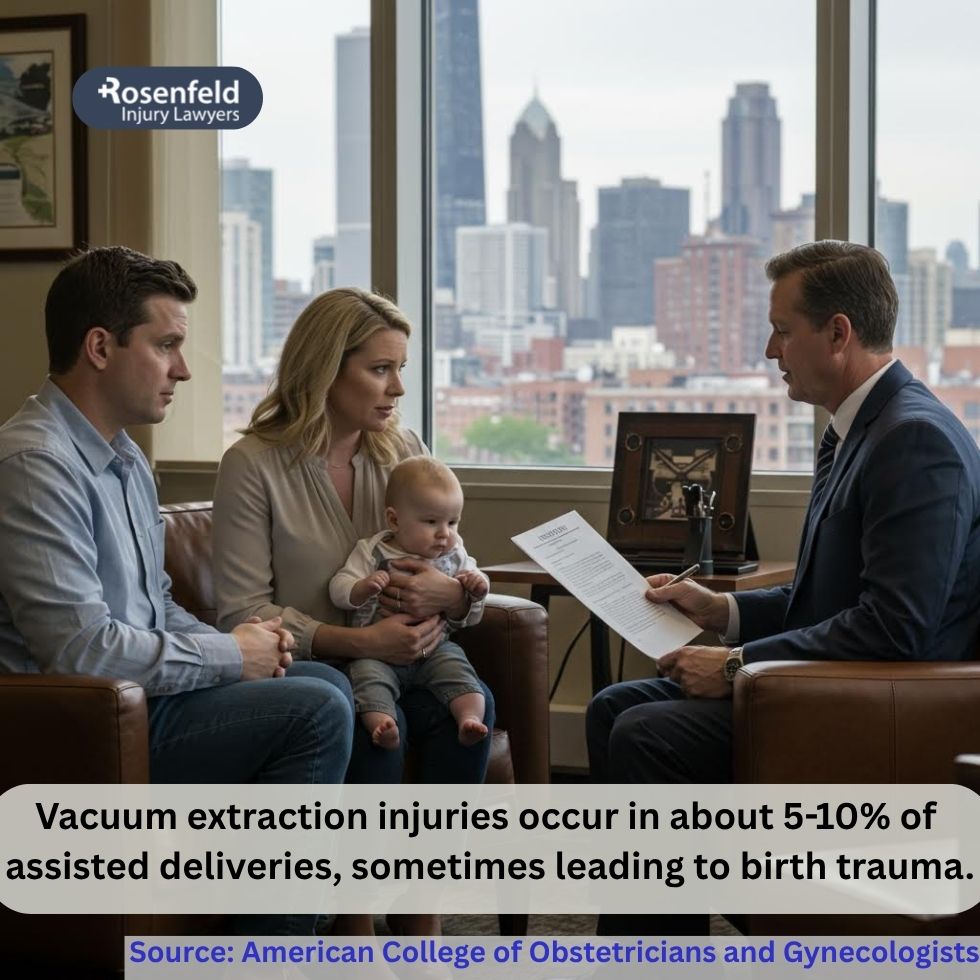- 24/7 Free Consultation: (888) 424-5757 Tap Here To Call Us
Chicago Vacuum Extraction Injury Lawyer

Seek Justice for Vacuum Extraction Injuries
If your baby suffered injuries due to vacuum extraction during birth, Rosenfield Injury Lawyers can help. Our experienced Chicago vacuum extraction injury lawyer team understands how medical negligence can lead to devastating outcomes. We work diligently to secure compensation for your child’s birth injury, protecting your family’s rights and future.
Vacuum extraction is a medical procedure used during vaginal delivery to assist with childbirth. During this vacuum-assisted birth, a specialized device consisting of a soft suction cup connected to a vacuum pump is gently placed on the baby’s head. As the mother pushes, medical personnel carefully apply suction to guide the baby through the birth canal.
Health care providers typically opt for vacuum extraction when complications such as fetal distress arise, labor fails to progress adequately, or the mother becomes too exhausted to continue pushing effectively.
Although considered a standard medical intervention, vacuum-assisted delivery requires proper technique and careful monitoring.
Settlements & Verdicts Recovered by Our Chicago Law Firm
At Rosenfeld Injury Lawyers, our team has extensive experience handling birth injury cases throughout Illinois, securing meaningful results for families affected by preventable medical mistakes during labor and delivery.
- $16,433,000 Settlement – Isabella was born at a Chicago hospital after prolonged labor led to oxygen deprivation. Delayed intervention by the medical staff resulted in permanent brain damage. Her family recovered $16.4 million, reflecting the need for lifelong medical care and the hospital’s failure to respond to clear warning signs of fetal distress.
- $11,250,000 Settlement – Noah suffered cerebral palsy after a Chicago-area delivery team failed to act quickly when signs of oxygen deprivation appeared. His personal injury claim centered on medical errors during labor. The $11.25 million settlement considered his long-term treatment expenses, future care needs, and permanent neurological injury.
- $11,000,000 Settlement – Maya was born with significant cognitive impairments after her parents, both genetic mutation carriers, were never informed of the risks. A Chicago physician failed to recommend testing before conception. Her family secured an $11 million settlement to cover past and future medical costs tied to preventable medical malpractice.

What Are the Risks of Vacuum Extraction?
While vacuum extraction is commonly used, improper use can result in serious injuries. Risks for the baby include scalp injuries such as swelling, bruising, and cuts.
More severe complications can involve skull fractures, bleeding within the baby’s brain, brachial plexus injuriesaffecting nerves in the shoulder and arm, cerebral palsy, and permanent brain damage. These vacuum extraction complications require immediate medical attention and may require lifelong treatment
Additionally, the mother may experience injuries such as trauma to the birth canal, excessive bleeding, or infection. Health care providers must use adequate techniques and closely monitor the delivery to reduce these potentially life-threatening injuries.
Although vacuum-assisted delivery can safely facilitate childbirth, improper use significantly increases the risk of severe injuries.
When healthcare providers fail to exercise appropriate caution or exceed recommended guidelines by applying excessive force, serious complications can arise for both the mother and the infant.
Understanding these risks is essential to ensuring proper treatment is received and holding medical personnel accountable for their actions.
Injuries to the Baby
Lacerations and Bruising
Minor injuries such as bruising, redness, and small cuts on the baby’s scalp often result from the suction cup used during vacuum extraction. These scalp injuries are common and typically heal quickly with minimal treatment.
Cephalohematoma
Cephalohematoma is a localized blood collection beneath the baby’s scalp caused by vacuum extraction. While this injury might appear concerning, it usually resolves without medical complications, though medical providers should monitor the baby carefully.
Subgaleal Hemorrhage
Unlike cephalohematoma, a subgaleal hemorrhage involves significant bleeding beneath the scalp and can pose life-threatening risks. Rapid medical treatment is necessary to prevent further complications, including shock or severe anemia.
Skull Fractures
In rare but severe cases, improper technique during vacuum extraction can lead to fractures of the skull, potentially causing severe damage and lifelong disability.

Intracranial Hemorrhage
Bleeding within the baby’s skull, known as intracranial hemorrhage, represents a severe complication of vacuum extraction, requiring immediate diagnosis and specialized medical treatment.
Brain Damage
Trauma during vacuum-assisted birth can lead to lifelong brain damage, cerebral palsy, developmental delays, and cognitive impairment.
Injuries to the Mother
Mothers undergoing vacuum extraction may experience trauma to the birth canal, resulting in perineal lacerations, which can vary in severity and require stitches or surgical intervention. Significant tearing or trauma may also cause excessive bleeding, increasing medical costs, and requiring further medical procedures.
Additionally, mothers often experience pain and discomfort lasting days or weeks after the delivery, impacting their recovery and ability to care for their newborn. Prompt identification and management of these maternal injuries by medical staff are necessary to reduce long-term complications and support overall recovery.

Do Vacuum Extraction Injuries Constitute Medical Malpractice?
Medical providers are responsible for upholding accepted standards of care during vacuum-assisted deliveries. While vacuum extraction can effectively assist vaginal births under proper conditions, negligence or improper practices can result in severe damage.
Families harmed by vacuum extraction medical malpractice have the right to seek compensation by establishing the healthcare professional’s negligence and demonstrating the connection between this negligence and their child’s injury.
Clear guidelines outline proper technique and timing for vacuum extraction to reduce potential complications. The device should be carefully placed onto the baby’s scalp, avoiding excessive pressure. Healthcare personnel must ensure correct positioning to prevent injuries to the baby’s head or scalp.
Health care providers should only initiate vacuum extraction during the appropriate stage of labor, typically when the mother is actively pushing, the baby is low in the birth canal, and fetal distress or maternal fatigue requires medical intervention.
Continuous monitoring throughout the procedure is essential to promptly detect complications and respond appropriately, including consideration of alternative measures, such as emergency cesarean delivery, if risks escalate.
Potential for Medical Negligence
Negligence during vacuum extraction occurs when staff deviates from accepted standards, significantly increasing the risk of serious injuries. Examples include:
- Improper Use of the Vacuum: Incorrect placement of the vacuum device, improper cup selection, or poor positioning increases the risk of injuries.
- Disproportionate Force or Traction: Applying too much pressure or forcefully pulling the baby can lead to brachial plexus injuries and skull fractures.
- Failure to Recognize Complications: Delays in recognizing signs of distress or complications, such as bleeding disorders or severe swelling, can worsen the baby’s injuries.
- Delay in Performing a C-Section: Waiting too long to transition to an emergency cesarean delivery after unsuccessful attempts at vacuum delivery heightens the risk of hypoxia, potentially causing brain injuries.
Establishing Negligence
To successfully pursue a medical malpractice claim, your legal team must establish four critical elements:
- Duty of Care: Demonstrating that a medical provider-patient relationship existed, establishing a clear duty for the medical professional to deliver proper and reasonable care throughout the delivery process.
- Breach of Duty: Identifying how the medical provider’s actions fell short of acceptable medical standards, such as failure to monitor distress or not promptly performing a cesarean section when indicated.
- Causation: Proving that the medical provider’s negligent actions or decisions directly resulted in your child’s injuries. Your legal team will carefully examine medical records, expert testimony, and evidence to demonstrate a clear link between negligence and the harm suffered.
- Damages: Documenting and presenting the resulting harm or losses due to negligence, such as the baby’s ongoing treatment expenses, physical therapy needs, future care requirements, and emotional distress. Damages may also include medical bills, and pain and suffering for the mother and child.

What Damages Can Chicago Victims Injured During Vacuum DeliveryRecover?
When your baby suffers serious injuries from negligence during vacuum delivery, your family may face significant emotional, physical, and financial challenges. Securing compensation can help manage these burdens, providing the resources necessary for your child’s care and protecting your family’s financial future.
Families affected by vacuum delivery complications can pursue various damages in a medical malpractice claim, including:
- Medical Expenses for Mother and Child: Compensation covers all incurred medical bills related to treating your child’s injury, hospital stays, surgeries, ongoing physical therapy, medication, and future treatments. Damages also cover medical costs for maternal injuries.
- Lost Wages: If parents miss work or leave their jobs entirely to care for a child injured during vacuum delivery, compensation can recover lost income and diminished earning potential.
- Pain and Suffering: Injuries during childbirth can cause significant physical discomfort and lasting emotional pain. Your claim can provide monetary relief for the pain endured by both the mother and child.
- Emotional Distress: The trauma of injuries during childbirth affects the entire family. Compensation can address psychological distress, such as anxiety, depression, or emotional trauma caused by witnessing or experiencing negligence.
- Loss of Enjoyment of Life: Severe injuries can profoundly impact your child’s quality of life. Your claim accounts for diminished enjoyment and the ability to experience life fully.
- Future Medical Costs: Many injuries sustained in childbirth require lifelong care and medical support. Compensation anticipates and covers these ongoing expenses, ensuring adequate future care.
How a Vacuum Extraction Injury Attorney Can Help
A dedicated Chicago birth injury lawyer provides valuable support and representation throughout your medical malpractice claim. Experienced attorneys understand the intricacies of these cases and diligently advocate for your family’s rights and compensation.
Investigating the Case
A thorough investigation determines precisely how the injury occurred, identifying any inadequate use of the extractor by staff during the delivery process.
Gathering Medical Records
Carefully examining documentation and evidence to establish what occurred during the vacuum delivery procedure. This step is essential for demonstrating negligence and building a strong legal case.
Consulting with Medical Experts
Working with trusted medical experts to assess the healthcare provider’s actions and identify deviations from accepted medical standards. Experts evaluate the severity of the baby’s injuries, prove negligence, and estimate future care requirements and costs.
Establishing Liability
Clearly defining who is responsible for your child’s injury, whether an individual medical professional, hospital, or other staff, and demonstrating how their negligence directly led to the injury.
Negotiating with Insurance Companies
Insurance companies often try to limit their liability by minimizing compensation. An experienced medical malpractice lawyer skillfully negotiates on your behalf, protecting your rights and interests to maximize the compensation you receive.
Filing a Lawsuit
If settlement negotiations fail to achieve a fair resolution, your attorney can confidently file a lawsuit, clearly articulating your case to the court and fighting vigorously for the compensation your family deserves.
What Is the Average Vacuum Extraction Injury Medical Malpractice Claim in Chicago?
According to Law.com’s VerdictSearch, the average medical malpractice award for cases involving vacuum extraction injuries is approximately $4,075,601, with a value range from $400,000 to over $14.1 million.
Several factors can influence the value of a vacuum delivery injury claim:
- Severity of the injury: Serious outcomes like brain injury or cerebral palsy often lead to higher compensation.
- Use of excessive force or pressure: Claims involving excessive traction pressure during vacuum delivery are more likely to succeed, primarily when supported by substantial medical evidence.
- Signs of fetal distress: Failure to respond to warning signs or to act appropriately during prolonged labor can increase liability.
- Impact on long-term health: Injuries that result in permanent disabilities or developmental delays significantly raise the value of a claim.
- Future medical expenses: The cost of ongoing treatment, therapies, and assistive care plays a significant role in the total award.
- Standard of care violations: If the medical staff failed to follow delivery protocols or continued with vacuum delivery despite risk factors, it may be considered medical malpractice.
Example Cases
$2.9 Million Settlement – Improper Vacuum Use and Missed Fetal Distress Leads to Infant Death
Maurice Hall was delivered at West Suburban Medical Center in Oak Park, where a vacuum extractor was used by a resident instead of an obstetrician. Maurice was born with an Apgar score of 1 and later diagnosed with brain damage due to suspected oxygen deprivation. His mother alleged that fetal monitoring showed late decelerations, which were ignored.
Despite transfer to a Chicago NICU, Maurice died at age one after prolonged complications. The hospital denied negligence but agreed to a $2.9 million settlement before trial, reflecting the severity of the injuries and loss of life.
$2 Million Verdict – Excessive Traction After Vacuum Delivery Causes Brachial Plexus Injury
In December 2006, Afolake Lawoyin delivered her daughter, Oladasoyin, at Saint Anthony Hospital in Chicago. After a vacuum-assisted delivery, Oladasoyin was born with a floppy right arm and later diagnosed with a brachial plexus injury. The family alleged that excessive traction was applied without recognizing signs of shoulder dystocia.
They also argued that informed consent for vacuum use was never obtained. At trial, the defense denied any complications, but the jury sided with the plaintiffs, awarding $2 million for permanent disability, future lost earnings, and pain and suffering.
$950,000 Settlement – Nerve Damage and Loss of Arm Function During Vacuum Delivery
In 1995, Temecka Williams gave birth at Mount Sinai Hospital in Chicago. During vacuum delivery, Dr. Leo Boler allegedly applied improper traction. Her daughter, Demecka, suffered an avulsion injury to the brachial plexus at C6-7, resulting in permanent nerve damage and severely limited use of her left arm.
The lawsuit claimed that a C-section should have been performed instead, and the vacuum use fell below accepted standards of care. While denying negligence, Dr. Boler reached a $950,000 settlement, covering medical costs, pain and suffering, and loss of a normal life.
$400,000 Settlement – Infant Dies from Brain Hemorrhage After Delayed and Forceful Vacuum Delivery
Alexa Fiocca was born at Northwestern Memorial Hospital in 2011 and died the next day from a brain hemorrhage caused by a comminuted skull fracture. The family alleged that Dr. Shayna Rubin delayed the delivery for several hours despite the mother being fully dilated and then used a vacuum extractor with excessive traction force, leading to fatal injuries.
The lawsuit also claimed the on-duty physician failed to intervene during clear signs of distress. Northwestern denied liability but agreed to a $400,000 settlement.
What Laws Govern Vacuum Extraction Injury Cases in Illinois?
735 ILCS 5/2‑622 requires that any medical malpractice claim must be filed with a certificate of merit. This written report, from a qualified medical professional, confirms that the case has a valid basis. Without this, the case risks dismissal. This rule ensures that claims involving alleged medical negligence are backed by expert medical opinion from the start.
735 ILCS 5/13-212 limits how much time families have to file a medical malpractice claim. In most cases, it’s two years from when the injury was discovered, but no more than four years from when it occurred. For injured children, the deadline extends to eight years, but never past the child’s 22nd birthday.
In the case of LeBron v. Gottlieb Memorial Hospital, the Illinois Supreme Court struck down caps on noneconomic damages in medical malpractice lawsuits. The court ruled that limiting jury awards for pain, suffering, or loss of normal life violated the state constitution.
How to Find the Right Vacuum Extraction Injury Attorney
Selecting the right vacuum extraction injury attorney to represent your family is a critical decision. Choosing a lawyer with a proven track record of success is essential. Look for a law firm experienced in handling these specific birth injury cases.
Attorneys with a demonstrated history of securing substantial compensation in similar cases are best equipped to advocate for your child’s injury, understand negligence intricacies, and fully address your family’s financial needs.
Additionally, compassionate and personalized attention is equally important. The emotional aftermath of such injuries is overwhelming for families, making it necessary to work with a legal team genuinely committed to your well-being.
An empathetic lawyer understands the emotional stress you’re experiencing, providing individualized support throughout the legal journey.
Finally, clear communication is vital. An effective vacuum extraction injury attorney will patiently and openly explain the legal process, answer your questions, clarify expectations, and keep you consistently informed about your case’s progress.
When your family is coping with a child’s birth injury, you deserve a dedicated legal advocate who guides you with transparency and compassion, ensuring you always feel supported and confident about the decisions being made.
File a Birth Injury Claim With Experienced Attorneys

If your child suffered serious injuries during vacuum delivery, Rosenfeld Injury Lawyers is ready to advocate for your family. Our approach emphasizes clear communication, ensuring you fully understand every stage of your case.
We have a proven record of success handling birth injury cases throughout Chicago and Illinois, consistently achieving positive outcomes for our clients. Our experienced legal team will carefully review your evidence, consult leading medical experts, and aggressively pursue maximum compensation from responsible health care providers.
We work on a contingency fee basis, meaning you pay nothing unless we win your case. Call us to schedule a free consultation with a Chicago personal injury lawyer.
All content undergoes thorough legal review by experienced attorneys, including Jonathan Rosenfeld. With 25 years of experience in personal injury law and over 100 years of combined legal expertise within our team, we ensure that every article is legally accurate, compliant, and reflects current legal standards.







